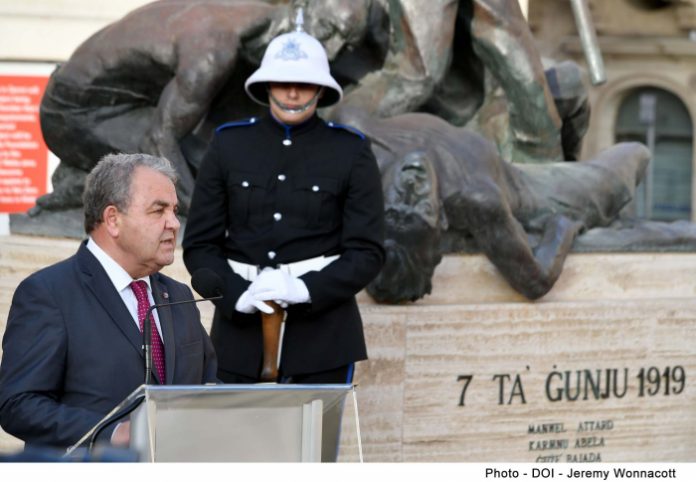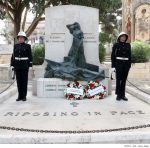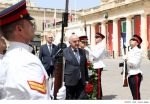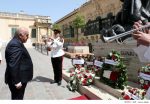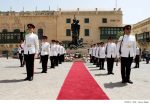Speech by Speaker Anġlu Farrugia on the occasion of Sette Giugno 2022
Tomorrow, June 7, apart from commemorating the riots that took place on June 1919 a few metres away from where we sit today, we shall also be marking the first month of Parliament’s 14th Legislature after its summoning following the general election of 26 March 2022. It is worth noting that with 79 members, this Parliament is, without a doubt, the biggest-ever Malta has had in its 100-year history, an anniversary which we celebrated last year. Of these 79 members, 34 – practically half – are newly elected Members, whilst 22 are female. These two aspects bode well towards achieving a parliamentary democracy which remains truly relevant and representative of our society.
I see this as also being linked to the 1919 Sette Giugno events we are commemorating today.
As we all know, the Sette Giugno events are symbolic of that time in Malta’s history characterised by massive protests in Valletta due to the prevailing economic problems burdening the country, primarily the high cost of bread which resulted in severe hunger for the man in the street. This situation led to significant political turmoil. There are those who opine that the Constitution in force at the time gave the Maltese very limited authority over the running of their country’s affairs. This scenario of a lack of political authority to govern in the best interest of one’s own country led to three families – Cassar Torregiani, Francia and Farrugia, who at the time were the main importers of wheat – ending up as the target of the Maltese people who, on 7 June 1919, went to Valletta to protest.
As a direct consequence of this uprising, on that same day and the day after, four Maltese citizens lost their lives. Manwel Attard, Karmnu Abela, Ġużè Bajada and Wenzu Dyer ‒ as they are remembered on this monument – succumbed to wounds inflicted by 64 British soldiers, who were sent to disperse a protest by Maltese citizens, and in doing so resorted to the use of force including the firing of shots on the crowd.
Several documents from that period show that in the protests of June 1919, in addition to these four men, up to four other persons were killed or seriously injured as a result of the use of firearms or bayonet charges. One of the victims, for example, was a father who came to Valletta to look for his son, but as he resisted arrest, was killed as a result of bayonet wounds. No less than 19 persons were also injured, including a 15-year-old boy. All this shows clearly what little, if any, authority the Maltese had when it came to maintaining order in their own country.
What does this all mean? The Maltese wanted to make progress. The Maltese wanted a better life. They wanted to acquire authority over the running of their own affairs. We must remember that at that time, the Constitution did not give any right to the Maltese in the running of the country, not even in local matters which affected them directly. As we know, this materialised two years later in 1921, with the granting of the Amery-Milner Constitution, also known as the Self-Government Constitution. Notwithstanding this step forward, it is worth noting that the right to elect one’s own representatives was limited to male property owners. No woman, even if a property owner through inheritance for example, had the right to vote. Almost another 30 years had to pass before women were given the right to vote, when in 1947 universal suffrage was established in Malta.
Whereas it is fitting that every year we recall the Sette Giugno events, I think that today, with a Parliament made up so many new representatives, who bring along such a wide range of experiences, and who undoubtedly all aspire to a better future for our country, we must stop and reflect on how each and every one of us can contribute towards the democratic development of our country. The advances made by the Maltese people following the Sette Giugno events of 1919 were instrumental in registering progress, albeit in small steps, towards the attainment of the first Constitution which gave the right to our forefathers over the running of the country’s internal affairs. The same can be said with regard to political developments which took place in the past months, where, with the agreement of the two main parties in the interest of representative parliamentary democracy, a number of amendments to the Constitution and to the electoral law were moved and adopted with the objective of enhancing female representation in Parliament. Thanks to this mechanism, which was applied for the first time during this year’s March 26 general election, the Maltese Parliament, after so many years, now has a worthier representation of a substantial part of our population through 22 female Members of Parliament. For the first time in its history, Parliament now has a 28% female representation, which although is still a long way from the goal of 40% representation, may certainly be considered a step in the right direction.
As the Sette Giugno events and others which followed have taught us, great achievements often find their beginnings in small steps. They are also testament to the fact that in every landmark political development, the way forward is never easy and when one embarks on the attainment of said developments, one should always keep forging ahead. Therefore it is now important that women’s participation and contribution in Parliament is felt and makes a difference, including in the 16 parliamentary committees and in the various inter-parliamentary organisations where the Maltese Parliament is represented. The latter is important also due to the fact that certain international organisations sanction those national parliamentary delegations which do not have adequate female representation by reducing the number of votes to which such a delegation would have been entitled to. This is a sanction that the Maltese Parliament has already experienced.
Just a few weeks ago, for example, at a meeting of the Inter-Parliamentary Union, an important organisation in which the national parliaments of all UN member states participate, there was a discussion about the war between Ukraine and Russia in which Malta participated fully and actively. Had the discussion led to a vote, Malta would have been entitled to two less votes because our delegation consistently did not include female members of parliament.
I believe that as an independent, sovereign and neutral country as entrenched in the Maltese Constitution, we are in the best position to argue with conviction on the importance of diplomacy, including parliamentary diplomacy, wherever there is conflict, war or disagreement between countries. It is essential that parliaments – which are the main representatives of the people – engage in dialogue, both at bilateral and multilateral levels. We are always ready to engage in unconditional dialogue with all national parliaments. This is why full and active parliamentary participation in such international organisations, such as the Inter-Parliamentary Union, the Commonwealth Parliamentary Association, the Parliamentary Assembly of the Council of Europe, and others, is important.
This leads me to another issue that I believe we should reflect upon today, that of how to allocate debating time in Parliament more efficiently. For example, given the increase in number of Members of Parliament who have the right to speak on any motion, bill or other matters, I believe that we should amend the relative Standing Orders of the House of Representatives as soon as possible, so as to reduce the maximum time allotted for interventions. I have no doubt that Members can make their argument in 20 minutes or less. If perhaps more time is needed to reach an agreement on the necessary amendments to the Standing Orders, as has happened in previous legislatures, the House should agree on a procedure motion setting out the maximum speaking time in Parliament to 20 minutes. In this way I believe that the debating time of the House can be used more productively in the interest of the common good, as after all is expected of the representatives of the Maltese people.
Another matter that I believe needs revisiting is that of the time at which Parliament meets, where this would better accommodate the professional, family, personal and even academic exigencies of the larger number of Members of Parliament. There is also the issue of the introduction of full-time Members of Parliament and the assistance that should be given to parliamentary groups. All of this should form part of the discussions that need to be given priority so that Members of Parliament will be better equipped to fulfill their mandate, even, if need be, by reallocating Parliament’s present resources.
I now wish to refer to an issue raised on several other occasions. I am referring to the citizen’s right of reply, a mechanism whereby citizens would have a right to reply to what has been stated in Parliament in their regard. I believe that the time has come to implement this parliamentary procedure. I reiterate that while it is essential that parliamentary privilege be maintained so that no Member is afraid of speaking the truth, it is equally important that no Member abuses such privilege and ends up harming persons, be they physical or juridical, who cannot reply and defend themselves in Parliament. To date, persons who feel that statements made in their regard by Members of Parliament while addressing the House or a Committee cannot take any remedial action, even if such statements cause suffering to these persons who could also be subject to proceedings in the courts.
There are several models, particularly in the Commonwealth, that one might consider when adopting such a parliamentary procedure. An interesting example is the one adopted by the New Zealand Parliament, where it is the Speaker who considers and decides whether what has been said in Parliament by a Member under parliamentary privilege, is sufficiently serious to be capable of adversely affecting a citizen, in which case, without going into the merit of the remarks that gave rise to the complaint, allows for the clarification made by such a citizen to be included in the records of the House. In other Commonwealth models, the Speaker refers the complaints he receives to a parliamentary committee for its consideration and decision.
The fact that this concept is not so common outside the Commonwealth should not deter us from introducing this parliamentary procedure which would provide a remedy to those citizens who may justifiably feel that the parliamentary privilege has been abused in their regard. This initiative would be similar to the one implemented a few years ago with the agreement of both sides of the House, when we introduced measures whereby citizens could petition Parliament directly without having to approach a Member of Parliament. Today, citizens know that that if their petition meets the established criteria, it will be considered by the Standing Committee on Petitions. Therefore, just as Parliament has taken steps forward in this regard, I believe that it is time to start looking at how to address this delicate but important issue of the citizen’s right of reply.
Looking back at the development of our Parliament over the past hundred years from the events we are commemorating today, we come to appreciate how a thriving parliamentary democracy requires that we keep on striving to find ways how to further strengthen this Institution to address the ever-changing expectations of the Maltese people. I have no doubt that this 14th Legislature will translate into an interesting five-year experience during which we all commit ourselves to having a Parliament that not only functions efficiently, but that will become increasingly relevant and an example of a functioning parliamentary democracy.
Whilst noting that the Sette Giugno events we are commemorating today provide us with the opportunity to recall and appreciate what our forefathers went through, I trust that this commemoration will strengthen our resolve to further strengthen our parliamentary institution for the good of both our people and those who will succeed us.


